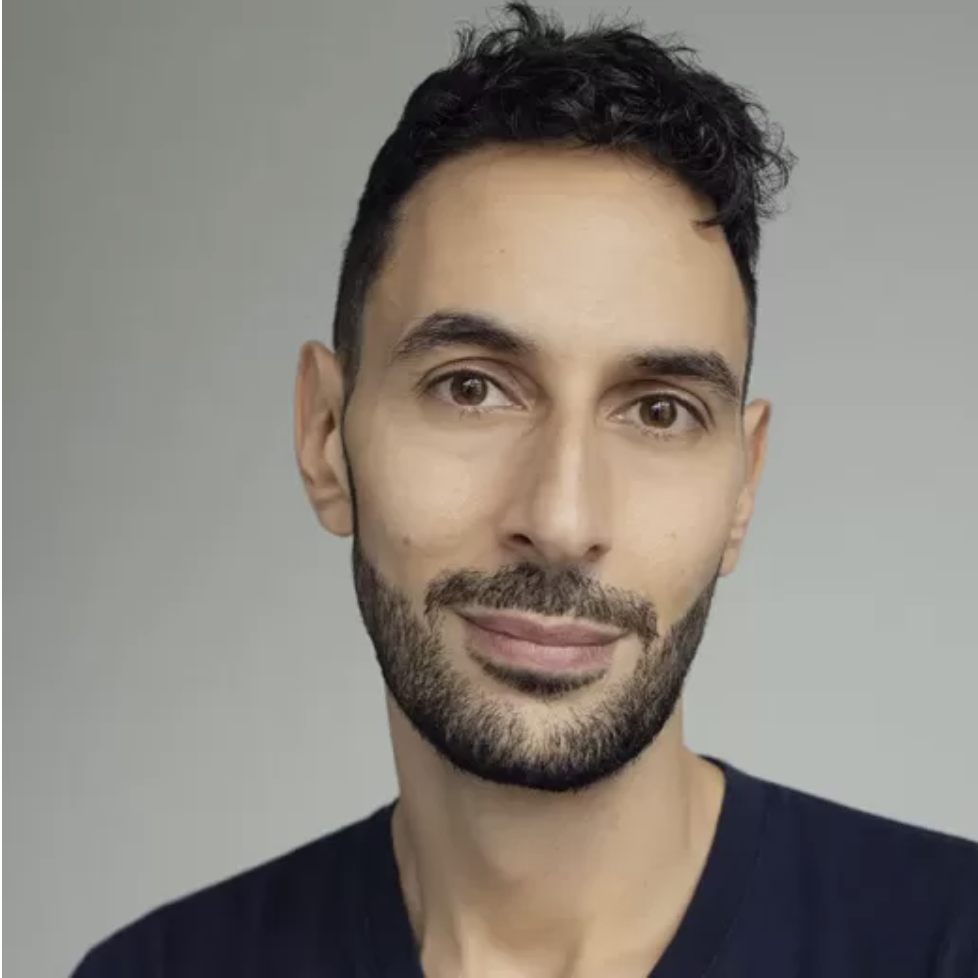

Born in Montreal to Egyptian parents, Eric Chacour has spent his life between France and Québec. His first book, What I Know About You, published in 2023 in Canada, changed his life. It took him 15 years to write while working in the financial sector. He never really dreamed of becoming an author. He wanted to be a songwriter.
That’s why he never expected his book to be such a massive success. It has won numerous awards, including the Quebec Bookseller’s Award 2024, Five Continent Award 2024, and Femina des lycéens Award 2024, and has been into over 20 languages, including Arabic.
What I Know About You explores several themes: uprootedness, following one’s own path, and homosexuality, among others. For Chacour, however, it’s all about love and how a person’s life can be turned upside down by it. Beyond the story of a young doctor named Tarek whose life will be turned upside-down after an unexpected encounter, the novel’s two-part structure is remarkable. The reader plays an active role in the reading process, filling in the gaps left by Chacour in the story. By remaining sometimes elusive, he allows us to create our own story within his own.
Having run a book club about it, it was fascinating to hear the diversity of points of view about What I Know About You. After that talk, I wanted to meet with Chacour. I was eager to understand how he had created such a complex love story. It’s rare to read such a well-crafted debut novel, and it’s also unusual for a writer to be able to talk about it the way Chacour does.
Benoit Landon: How did you decide to become a writer at almost 40?
Eric Chacour: I never told myself that I would be a writer. It would have terrified me. I wanted to be a songwriter. It was my dream, but I didn’t know how to compose and I didn’t have any composer friends so I figured that telling a story was more accessible and didn’t rely on anyone. So, I embarked on What I Know About You about fifteen years ago.
BL: What was the writing process like for What I know About You?
EC: I knew quite early on what I wanted to write about. I had two images colliding. On the one hand, I wanted to write a male Romeo and Juliet; on the other, I wanted to write a love letter to my parents’ Egypt, very different from what a tourist might discover today. I grew up with stories from my parents, my aunts and uncles, and their friends about the French-speaking Levantine community. They listened to the same music as in France and had a lifestyle influenced by their Syrian or Lebanese origins. I wanted to use this Egypt as a backdrop.
BL: Did you decide to write What I Know About You because you didn’t know enough about that community?
EC: I wanted to tell this story because it fascinated and surprised me. I think there’s always a bias when someone talks about the country they knew as a child. You never know whether they’re talking nostalgically about the country or their childhood. There was something fascinating about this Egypt, which wasn’t representative of the whole country, but of the Levantine community, with people who went to mass together, who met in each other’s homes, who prepared Lebanese dishes, who spoke French before they had learned Arabic.
This Egypt also surprised me because when I went there––I’ve been there fifteen times in my life––I never found it again. I couldn’t even see a distant version of it. I wondered why all my parents’ friends were so different from all the Egyptians I met in Egypt. Eventually, I realized: this was the Egypt of a community that had left en masse at a certain time.

BL: How did you create What I Know About You‘s main character, Tarek?
EC: I wanted a character who didn’t ask many questions, whose life was written in advance and comfortable. This was one of the challenges of the writing process: I had to tell the story of why a boy suddenly had to question his existence for the sake of a spark. Tarek is part of the Levantine community, his father is a doctor, and he becomes a doctor like his father. His friends are the children of his parents’ friends. He would certainly have had the same place in the community as his parents and married his childhood sweetheart had it not been for his encounter with Ali. His life was written in advance, but lives written in advance make mediocre novels.
BL: Why did you set this character in the 80s?
EC: I didn’t want him to exist in the world of social networking, where it’s so easy to find someone. I wanted him to live in a time when fatality meant that if you didn’t know someone’s address or number, you lost them for life. Our society couldn’t have harbored such a tragic love story. Nevertheless, I’m pretty impervious to nostalgia.
BL: Are you still haunted by this uprooting?
EC: I think it has shaped me, like everything that came before us. I’ve often tried to imagine the look on my parents’ faces when they arrived in Quebec. I know they had already experienced snow because they sometimes went to Lebanon on vacation. However, when I hear a program on TV or a conversation, I sometimes think that it must have been so different from what they experienced, and I try to put myself in their shoes, to wonder how they reacted. I think there are many exiles, and it’s important to understand what makes a person’s journey take them to another country.
BL: In What I Know About You, the women play a major role, with stronger personalities than the men. Why was it important for them to have these traits?
EC: They’re really the heroines of What I Know About You. Each of the female characters is more interesting than Tarek. I wanted to tell the story of this paradox: How, in this traditional society, a man can feel crushed by the weight of responsibility placed on his shoulders because he’s a man, and how in the same society a woman can also be crushed by the weight of responsibility denied her because she’s a woman.
In What I Know About You, the mechanism begins in childhood. The boy is expected to come up with answers, because the weight of family tradition is on his shoulders, and he has to submit to it.
BL: You were raised by Egyptian parents, but you’ve also lived in France and Canada. Do you think this inequality of treatment is the same everywhere?
EC: It’s typical of all traditional societies to place a whole host of responsibilities on the man and to take some away from the woman. One of the consequences is that women reclaim their power through the family sphere. That’s why I wanted the women in What I Know About You to be so strong. When I talk about my family, I often refer to it as the British Royal Family, which comprises very great queens and very small kings (I like to put myself in that category). I come from a family where women have this greater presence and probably more ambition and stature than men.
BL: In What I Know About You, Tarek is forced to flee because of his sexuality. In Egypt, does being homosexual necessarily mean one has to run away?
EC: I hope not, but I don’t often see news in the media that gives me excessive hope on the subject. I hope it’s possible to live a love story without running away. Tarek’s tragedy is that every time he deviates from what we had planned for him, it puts a grain of sand in the cog. The simple fact of having opened a dispensary far from the prestigious family practice was a first step aside. When he decides to move to Montreal, it’s because he has no other choice. Or because any other answer would seem unbearable.
The truth is, it’s one of the very few choices he’s made because he’s more into avoidance than initiative.
Related Posts
Eric Chacour On His Debut Novel What I Know About You

Born in Montreal to Egyptian parents, Eric Chacour has spent his life between France and Québec. His first book, What I Know About You, published in 2023 in Canada, changed his life. It took him 15 years to write while working in the financial sector. He never really dreamed of becoming an author. He wanted to be a songwriter.
That’s why he never expected his book to be such a massive success. It has won numerous awards, including the Quebec Bookseller’s Award 2024, Five Continent Award 2024, and Femina des lycéens Award 2024, and has been into over 20 languages, including Arabic.
What I Know About You explores several themes: uprootedness, following one’s own path, and homosexuality, among others. For Chacour, however, it’s all about love and how a person’s life can be turned upside down by it. Beyond the story of a young doctor named Tarek whose life will be turned upside-down after an unexpected encounter, the novel’s two-part structure is remarkable. The reader plays an active role in the reading process, filling in the gaps left by Chacour in the story. By remaining sometimes elusive, he allows us to create our own story within his own.
Having run a book club about it, it was fascinating to hear the diversity of points of view about What I Know About You. After that talk, I wanted to meet with Chacour. I was eager to understand how he had created such a complex love story. It’s rare to read such a well-crafted debut novel, and it’s also unusual for a writer to be able to talk about it the way Chacour does.
Benoit Landon: How did you decide to become a writer at almost 40?
Eric Chacour: I never told myself that I would be a writer. It would have terrified me. I wanted to be a songwriter. It was my dream, but I didn’t know how to compose and I didn’t have any composer friends so I figured that telling a story was more accessible and didn’t rely on anyone. So, I embarked on What I Know About You about fifteen years ago.
BL: What was the writing process like for What I know About You?
EC: I knew quite early on what I wanted to write about. I had two images colliding. On the one hand, I wanted to write a male Romeo and Juliet; on the other, I wanted to write a love letter to my parents’ Egypt, very different from what a tourist might discover today. I grew up with stories from my parents, my aunts and uncles, and their friends about the French-speaking Levantine community. They listened to the same music as in France and had a lifestyle influenced by their Syrian or Lebanese origins. I wanted to use this Egypt as a backdrop.
BL: Did you decide to write What I Know About You because you didn’t know enough about that community?
EC: I wanted to tell this story because it fascinated and surprised me. I think there’s always a bias when someone talks about the country they knew as a child. You never know whether they’re talking nostalgically about the country or their childhood. There was something fascinating about this Egypt, which wasn’t representative of the whole country, but of the Levantine community, with people who went to mass together, who met in each other’s homes, who prepared Lebanese dishes, who spoke French before they had learned Arabic.
This Egypt also surprised me because when I went there––I’ve been there fifteen times in my life––I never found it again. I couldn’t even see a distant version of it. I wondered why all my parents’ friends were so different from all the Egyptians I met in Egypt. Eventually, I realized: this was the Egypt of a community that had left en masse at a certain time.

BL: How did you create What I Know About You‘s main character, Tarek?
EC: I wanted a character who didn’t ask many questions, whose life was written in advance and comfortable. This was one of the challenges of the writing process: I had to tell the story of why a boy suddenly had to question his existence for the sake of a spark. Tarek is part of the Levantine community, his father is a doctor, and he becomes a doctor like his father. His friends are the children of his parents’ friends. He would certainly have had the same place in the community as his parents and married his childhood sweetheart had it not been for his encounter with Ali. His life was written in advance, but lives written in advance make mediocre novels.
BL: Why did you set this character in the 80s?
EC: I didn’t want him to exist in the world of social networking, where it’s so easy to find someone. I wanted him to live in a time when fatality meant that if you didn’t know someone’s address or number, you lost them for life. Our society couldn’t have harbored such a tragic love story. Nevertheless, I’m pretty impervious to nostalgia.
BL: Are you still haunted by this uprooting?
EC: I think it has shaped me, like everything that came before us. I’ve often tried to imagine the look on my parents’ faces when they arrived in Quebec. I know they had already experienced snow because they sometimes went to Lebanon on vacation. However, when I hear a program on TV or a conversation, I sometimes think that it must have been so different from what they experienced, and I try to put myself in their shoes, to wonder how they reacted. I think there are many exiles, and it’s important to understand what makes a person’s journey take them to another country.
BL: In What I Know About You, the women play a major role, with stronger personalities than the men. Why was it important for them to have these traits?
EC: They’re really the heroines of What I Know About You. Each of the female characters is more interesting than Tarek. I wanted to tell the story of this paradox: How, in this traditional society, a man can feel crushed by the weight of responsibility placed on his shoulders because he’s a man, and how in the same society a woman can also be crushed by the weight of responsibility denied her because she’s a woman.
In What I Know About You, the mechanism begins in childhood. The boy is expected to come up with answers, because the weight of family tradition is on his shoulders, and he has to submit to it.
BL: You were raised by Egyptian parents, but you’ve also lived in France and Canada. Do you think this inequality of treatment is the same everywhere?
EC: It’s typical of all traditional societies to place a whole host of responsibilities on the man and to take some away from the woman. One of the consequences is that women reclaim their power through the family sphere. That’s why I wanted the women in What I Know About You to be so strong. When I talk about my family, I often refer to it as the British Royal Family, which comprises very great queens and very small kings (I like to put myself in that category). I come from a family where women have this greater presence and probably more ambition and stature than men.
BL: In What I Know About You, Tarek is forced to flee because of his sexuality. In Egypt, does being homosexual necessarily mean one has to run away?
EC: I hope not, but I don’t often see news in the media that gives me excessive hope on the subject. I hope it’s possible to live a love story without running away. Tarek’s tragedy is that every time he deviates from what we had planned for him, it puts a grain of sand in the cog. The simple fact of having opened a dispensary far from the prestigious family practice was a first step aside. When he decides to move to Montreal, it’s because he has no other choice. Or because any other answer would seem unbearable.
The truth is, it’s one of the very few choices he’s made because he’s more into avoidance than initiative.
SUPPORT US
We like bringing the stories that don’t get told to you. For that, we need your support. However small, we would appreciate it.








